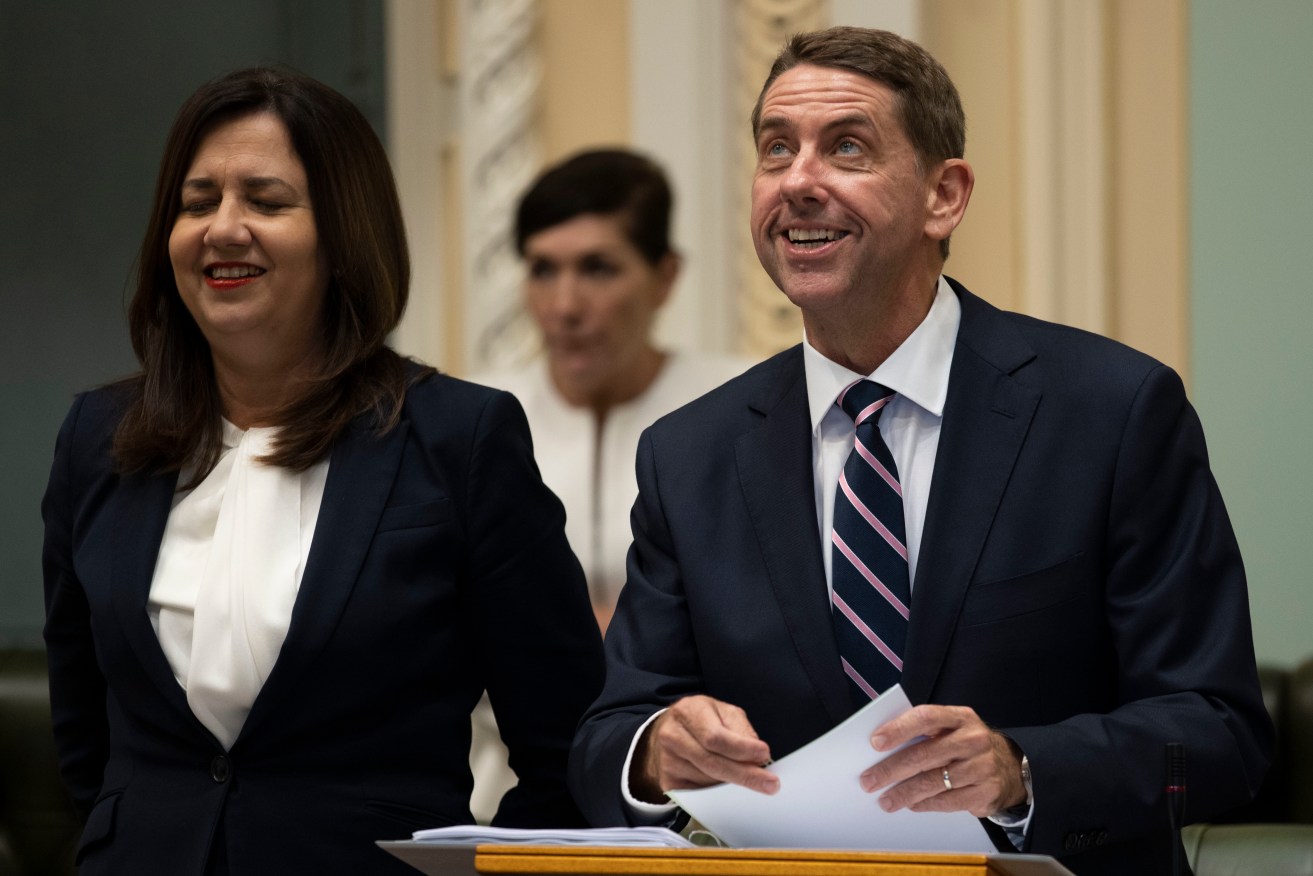Hey presto: Dick counts on property boom, asset revaluation to pull Budget rabbit out of hat
Treasurer Cameron Dick has reset the Queensland Budget trajectory, using a snap revaluation to pay off debt, set aside funds and promise a return to surplus in 2024.

Queensland Treasurer Cameron Dick with Premier Annastacia Palaszczuk in parliament. (AAP Image/Glenn Hunt)
The budget handed down today follows through with Labor’s election commitments and provides for moderate increases in health, social housing and education. Treasury figures show the private sector is doing better than the government predicted, leading to more tax revenue in some areas and a better jobs outlook overall, even if coal royalties are down and energy dividends will all-but disappear in future.
“The jobs are coming back, the economy is coming back, and Queensland is coming back and we’re so happy about that,” Dick told journalists.
Amidst this turnaround, Dick has rewritten the government’s economic principles, once again promising a tight rein on expenditure as soaring stamp duty revenue compensates for the decline in coal royalties. He has also been able to “bend the debt profile” while at the same time asking Queenslanders to accept debt is a necessity, mostly to fund infrastructure projects the government will now choose more carefully.
The big change in this budget – the second from Dick in little over six months – comes from a paper revaluation of the Queensland Titles Registry, which is being used to establish a separate Debt Retirement Fund. While Labor insists the registry is not for sale, the notional price tag has gone from around $4 billion to $7.8 billion, due to changes in the fine print that provided Dick with an unexpected windfall.
This glowing asset reduces Dick’s reliance on debt and allows him to set aside money for a $2bn Hospital Building Fund, $1bn Housing Investment Fund Housing, $300 million Path to Treaty Fund, among others. While big ticket items, only the interest from those funds will be used to boost regular expenditure in those areas, however it goes to demonstrate Labor’s priorities.
Combined with the recent revenue surge, the windfall will help trim the 2021-22 budget operating deficient to $3,485 million, and deliver a surplus of $153 million in 2024-25, coincidentally an election year.
Stamp duty collections in 2021-22 are likely to be up more than $1.6 billion on previous forecasts, and almost $1 billion higher than forecast for the following year. Despite rising house prices, the government will not adjust its tax thresholds, ensuring Treasury continues to benefit from the boom. It expects new and used dwelling investment to soar 20.5 per cent in 2021-22 (compared to six per cent forecast in the last budget) but more subdued renovation activity.
Net debt – the measure of borrowings the government prefers to be judged on – will increase at a slower rate but still hit $42,573 million in 2024-25. That creates a 121 per cent debt-to-revenue ratio, which Dick insists will still be better than other states.
“Debt is not a dirty word,” he said.
Dick expects NSW and Victoria to have a credit ratings downgrade, but Queensland to remain unchanged. He denied the threat of a downgrade prompted the registry revaluation.
Overall, expenditure is forecast to increase faster than previous estimates, but so too is revenue. Dick has ditched the fiscal principle tied to public service numbers – the hiring freeze will remain for another year at least – and will instead seek to ensure revenue growth is trending better than expenditure growth, which appears likely.
The hospital fund will increase core capital works expenditure in health by $60 million a year, most likely on IT services – Dick mentioned funding for the Toowoomba Day Surgery but this had already been promised – while more money will be spent dealing with bed shortages.
The housing fund will bring forward the construction of social housing, but Dick acknowledged it would still not clear the waitlist.
“This is one budget, I’ve got three more to go,” Dick said, referring to the fixed four-year term.
Premier Annastacia Palaszczuk insisted it was a strong Labor budget, focussed on health and social housing, but rejected a suggestion both areas were in crisis under her government.
She said the government had heard Queenslanders’ concerns about housing and was responding as only Labor could, by promising to build more homes.












